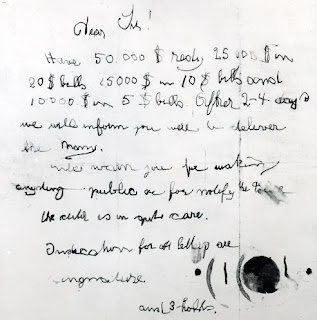Language and the Law
I realize it's only fair if I explain forensic linguistics, as it is the theme of my blog (and my life, to be honest). My professor, Dr. Rob Leonard, is fond of explaining it like this: "Forensic linguistics is the intersection of language and the law." Instead of describing the entire science, this post is my attempt at explaining where forensic linguistic analysis fits within the legal system. In attempting so, I am writing from my own experience and education. I am an American, and I attend only one of the world's few graduate programs for forensic linguistics.
The fact is, criminal cases are only half of forensic linguistics. The other half is civil cases; such as those that concern plagiarism or copyright infringement. Legal documents such as laws, legislation, contracts, and testimony can also require forensic linguistic analysis.
The word "forensic" comes from the Latin "forum" and related "forensis"; the latter meaning "of the public/forum." If you remember that forums are assemblies, conferences, etc., the connection to courts of law is more obvious. In fact, any kind of science that gets the adjective "forensic" often has the same dichotomy of criminal and civil legal work. It should go without saying that both are incredibly important and fascinating in their own ways.
Now that I've covered the etymology, I can describe the science. Forensic linguistics is essentially the application of language science (linguistics) to language evidence: written or recorded. As a technique, forensic linguistics has been used in cases for a very long time. As a specialty field of its own, forensic linguistics is relatively new. It's not a new science; just a newly minted specialty. In practice, forensic language analysis can call for most methods of linguistics, i.e., morphology, phonology, phonetics, sociolinguistics, discourse analysis, and dialectology. The methods used depend largely on the kind of evidence available as well as the nature of the case.
Additionally, forensic linguists consider aspects of criminal investigations and the justice system that may be unfamiliar to the average linguist. That distinction can be pivotal to the analysis of evidence. It is one thing to analyze a statement for its language, and it is something else entirely to analyze it for, say, deception cues or bribery codes. In fact, there are methods quite unique to forensic linguistics developed just for such kinds of evidence.
Forensic linguistics has been used to analyze evidence such as confession statements, legislation codes, text messages, patents, suicide notes, business contracts, spray painted curses at a crime scene, entire books, and more. Suffice it to say that forensic linguistics is applicable to a great variety of language evidence. If the evidence contains or is words, it can be examined with forensic linguistics.
The fact is, criminal cases are only half of forensic linguistics. The other half is civil cases; such as those that concern plagiarism or copyright infringement. Legal documents such as laws, legislation, contracts, and testimony can also require forensic linguistic analysis.
The word "forensic" comes from the Latin "forum" and related "forensis"; the latter meaning "of the public/forum." If you remember that forums are assemblies, conferences, etc., the connection to courts of law is more obvious. In fact, any kind of science that gets the adjective "forensic" often has the same dichotomy of criminal and civil legal work. It should go without saying that both are incredibly important and fascinating in their own ways.
Now that I've covered the etymology, I can describe the science. Forensic linguistics is essentially the application of language science (linguistics) to language evidence: written or recorded. As a technique, forensic linguistics has been used in cases for a very long time. As a specialty field of its own, forensic linguistics is relatively new. It's not a new science; just a newly minted specialty. In practice, forensic language analysis can call for most methods of linguistics, i.e., morphology, phonology, phonetics, sociolinguistics, discourse analysis, and dialectology. The methods used depend largely on the kind of evidence available as well as the nature of the case.
Additionally, forensic linguists consider aspects of criminal investigations and the justice system that may be unfamiliar to the average linguist. That distinction can be pivotal to the analysis of evidence. It is one thing to analyze a statement for its language, and it is something else entirely to analyze it for, say, deception cues or bribery codes. In fact, there are methods quite unique to forensic linguistics developed just for such kinds of evidence.
Forensic linguistics has been used to analyze evidence such as confession statements, legislation codes, text messages, patents, suicide notes, business contracts, spray painted curses at a crime scene, entire books, and more. Suffice it to say that forensic linguistics is applicable to a great variety of language evidence. If the evidence contains or is words, it can be examined with forensic linguistics.

Well written! I had no idea thats where forensics comes from for the science. But makes sense, because in my debate past, the tournaments and classes and organization were technically called 'forensic debate'
ReplyDelete